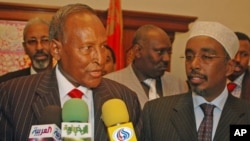As the Somali government attempts to oust Islamist insurgents from southern and central Somalia, the European Union is shifting its support and demanding results from the transitional leaders.
European Union officials are in East Africa to assess the situation on Somalia and evaluate the EU's support of the troubled transitional federal government. The trip comes in the midst of an offensive - recently launched by the government - to wrest control of southern and central Somalia from al-Qaida-linked rebels, al-Shabab.
Fighting has raged over the past few weeks across the region and in the capital, Mogadishu, where the government controls only part of the city. Casualties are climbing and at least 50 soldiers from the African Union peacekeeping mission, AMISOM, have been killed. The clashes also have spilled into Kenya and Ethiopia, as both sides look to control crucial entry and exit points into their war-torn neighbor.
Speaking in Nairobi on Tuesday, the European Union’s managing director for African relations, Nick Westcott, said the renewed fighting, however, must not distract Somalia’s transitional government from badly needed reforms required under its mandate.
"Clearly security developments and political developments go hand in hand in Somalia. But the political process has to get underway. You can’t freeze the political process because there is an offensive going on," said Westcott.
The transitional federal government, founded in 2004, originally was tasked to deliver a new constitution and national elections in Somalia by August of this year. But with little or no progress made towards those goals, the transitional federal parliament in February voted unilaterally to extend its term for an additional three years.
The extension was slammed by Somalia’s main backers, including Europe, the United States and the United Nations - all of which criticized the parliament for failing to consult the Somali people.
Westcott told reporters such an extension could be justified only by progress towards fulfilling the government’s mandate. "We regret the auto-extension because we felt there was an opportunity here, which was missed, to build more of a political consensus and set some criteria and a roadmap of change that would justify the extension," he said.
Westcott revealed he would be meeting with Somali Speaker of Parliament Sharif Hassan Sheikh Aden to discuss retroactively linking the parliament’s extension with benchmarks of government progress.
Westcott also hinted at a shift towards the approach of the European Union towards Somalia’s breakaway states: Somaliland and Puntland.
"Some parts of Somalia - some regions - have started becoming increasingly stable and, where there are these nodes of stability, we, the European Union, want to support them," he said.
Both Somaliland and Puntland are autonomous regions in northern Somalia, which are relatively stable and conflict-free. Somaliland declared total independence from its neighbors in 1991, but has not been recognized internationally. Officials told journalists the two regions were the focus of more than $300 million worth of current and future EU development projects planned for the country.
The shift follows a similar change in strategy by the United States, which recently revealed it would begin to diplomatically engage, though not officially recognize, both regions as part of its Somalia strategy.
Somalia has not had a functioning government since 1991, when dictator Mohammed Siad Barre was overthrown by warlords, plunging the country into 20 years of continuous violence.
















